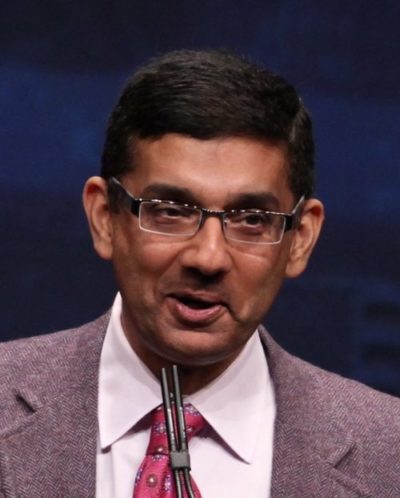(UPDATE – 6/11/19) – See below the post for an update.
For Dinesh D’Souza watchers, this headline is as shocking as proclaiming that water is wet. I post this incident because it is a clear and convincing demonstration that D’Souza shows zero interest in academic integrity. Let me lay out the basics. First, D’Souza claimed in a speech that no Republican owned slaves in 1860. Here is the speech:
Do you know how many Republicans owned slaves in 1860, the year before the Civil War started?
The answer may surprise you if you listen to progressive (fake) historians.
ANSWER ⬇️ pic.twitter.com/3zzfWVkx2v
— Dinesh D’Souza (@DineshDSouza) June 10, 2019
He said one Republican who owned a slave in 1860 would require him to take back his claim.
Historians on Twitter, led by Princeton’s Kevin Kruse, quickly rose to the occasion and found ten. Follow the thread below for the receipts.
We’ve provided clear evidence that at least ten Republicans owned slaves in 1860, and yet D’Souza keeps retweeting this video insisting there weren’t any and promising he’d “take it back” if anyone proved otherwise.https://t.co/rbLnQDdMCM
— Kevin M. Kruse (@KevinMKruse) June 10, 2019
To go directly to the thread with the breakdown of the ten found thus far, click here.
In essence, the method of finding Republican slave owners involves an examination of those who attended the Republican convention as delegates and then comparing that list with registries of slave owners.
For his part, D’Souza said the instances offered by the historians are “invalid” and he repeated his claim this morning.
I looked for counter evidence in D’Souza’s threads and nothing shows up. D’Souza said no Republican owned slaves in 1860, but in fact at least ten Republicans are on record as being slave owners during that year. It doesn’t change the fact that the Republican party generally opposed the expansion of slavery but it does prove that D’Souza’s specific claim is false. His handling of the matter also shows that he cannot be trusted in a dispute like this (as if there was any doubt).
This incident is a case study in cognitive dissonance for D’Souza followers. Will they believe their senses or go along with their loyalty to D’Souza? There is a solid research base in social psychology which suggests his followers will find some way to ease the dissonance and stick with D’Souza. Most will never know about it because they won’t read any of the historians’ posts. Some will simply assume the historians can’t be right because they are “libs.” Those who do engage with the material will have the most trouble. They will hang on D’Souza’s denials and assertions. A few may file this away as a “rare” mistake on D’Souza’s part so they can hold on to other things about him they like. A very few may actually reconsider his integrity.
Where this challenges to D’Souza eventually may have some benefit is to cause venues like Christian colleges and other organizations who might consider having him in to speak to reconsider. I use instances like this one in my classes as illustrations for concepts like ingroup bias, confirmation bias, belief perseverance, and cognitive dissonance. This one will go to the top of the class.
UPDATE – D’Souza admitted he was wrong on his claim with a sorry, not sorry tweet.
So I’ll modify my original claim to say that in 1860, we can count on two hands the number of Republican slaveowners. Moreover, the vast, vast majority of the 4 million slaves in the country then were owned by Democrats. I’ll conclude by asking @KevinMKruse if he agrees with THAT
— Dinesh D'Souza (@DineshDSouza) June 10, 2019
If you click the tweet and read through the thread, you will see the “sorry, not sorry” attitude of the response. He still hasn’t taken down the original tweet. D’Souza insists on promoting a false picture of historiography surrounding party realignment. He tells his followers that historians obscure the role of Democrats in the defense of slavery. They don’t obscure anything. He isn’t a great revealer of hidden truths. What D’Souza obscures is the fact that the parties realigned and that there were Republican racists all along the way. He also insists that the parties now are of the same character as they were 150 years ago.
His admission is striking and had to happen because he was caught red handed. His reputation should be in some jeopardy now for anyone who objectively evaluates his rhetoric. Prior to his admission, his claims were absolute. He said many people had already spent much time trying to debunk his claim. In fact, it took a few historians about 30 minutes to counter it. This was a devastating rebuke. D’Souza’s confident claims should never again be taken at face value by anyone. It isn’t that scholars don’t make factual mistakes, of course they do. However, true scholars aren’t as absolutistic and arrogant as D’Souza. He went out on a limb above a canyon, and it was cut off.
